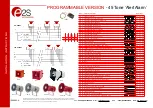
Work
flow
User Manual - RAB237AEN
4–29
7.3.4. HGB blank reference
◆
A suspicious flag, shown by an exclamation mark (!) located next to the hemoglobin result shows
that the HGB blank carried out during the analysis differs from the previous cycle
'
s HGB blank.
This (!) means that both HGB blanks were outside the instrument precision limits.
◆
This result can be reported, but the parameter should be monitored for the next sample analyzed.
◆
The MCH and MCHC may also be affected by this (!) flag depending on the severity of the results.
7.4. Morphology flags
7.4.1. Flags on PLT distribution curve
◆
The PLT histogram has 128 channels between 2fl and 30fl. A mobile threshold (positioned to 25fl
by default) moves according to the microcyte population present in the platelet analysis area.
◆
The PLT flags are as follows:
1-
An excessive presence of cells to the right of the threshold area (25fl) will trigger the "
MIC
"
(microcytes) flag. The mobile threshold looks for a valley between the 25fl (standard value) and 18fl.
2-
When there is no valley between PLT and RBC populations, a reject PLT (*) flag is triggered. PLT
results are not reliable and must be verified by a manual platelet count.
3-
If the number of particles between 18fl and 25fl are too high, the "
SCH
" (schistocytes) flag will
be triggered. Suspected abnormalities include:
- Presence of schistocytes.
- Presence of platelet aggregates: verify the platelet results on a stained blood smear.
4-
The "
SCL
" (small cells) flag indicates the presence of small cells in the 2fl to 3fl zone.
7.4.2. Flags on WBC distribution curve
◆
The ABX Micros
ES60
OT/CT has a system of WBC differential flags alerting the operator to the
possible presence of pathological cells, abnormal volume distribution histograms, or abnormal
elevated populations such as the excessive presence of eosinophils and basophils.
1-
Flag "
L1
" indicates an abnormal number of cells, in comparison with the lymphocytes, in the 30fl
to 60fl zone. The pathological elements which may be found in this area will include:
If the suspicious flag (!) occurs more than 3 times on consecutive sample
runs, troubleshoot the HGB (See Section 7,
Diag.4-31 PLT distribution curve
Diag.4-32 WBC distribution curve with flagging regions
PLT
WBC distribution curve with flag regions
Lymphocytes
LYM
Monocytes
MON
Granulocytes
GRA
# of
cells
cell volume
M2
G1
G2
G3
L1
Summary of Contents for ABX MICROS ES60
Page 1: ...Explore the future ABX Micros ES60 HAN706A 2007 HORIBA ABX User manual P n RAB237AEN...
Page 2: ......
Page 6: ...User Manual RAB237AEN...
Page 68: ...ABX Micros ES60 OT CT 3 12 User Manual RAB237AEN...
Page 116: ...ABX Micros ES60 OT CT 5 18 User Manual RAB237AEN Diag 5 21 LJ graphs printout example...
Page 128: ...ABX Micros ES60 OT CT 5 30 User Manual RAB237AEN...
Page 148: ...ABX Micros ES60 OT CT 6 20 User Manual RAB237AEN...
Page 196: ...ABX Micros ES60 OT CT 7 48 User Manual RAB237AEN...
















































